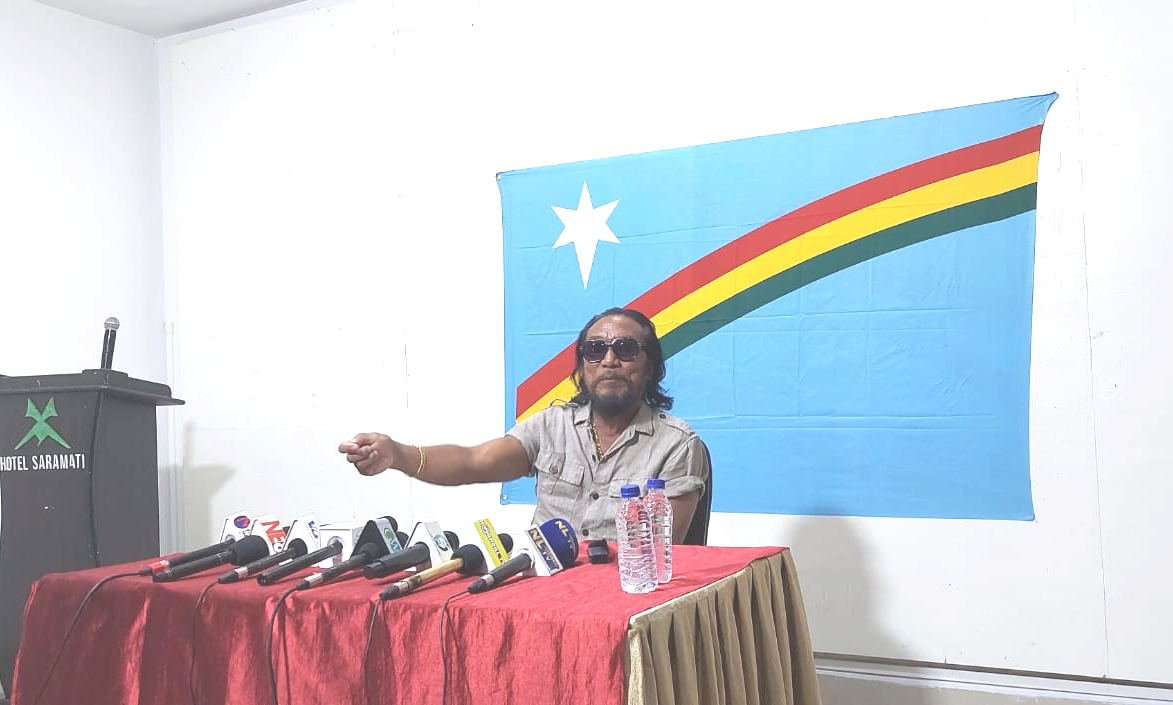President of NSCN/GPRN (K) [Niki] faction, Gen (Retd) Niki Sumi has urged Naga intellectuals, political parties, state government representatives, civil societies, and Naga political groups to come together on a common platform to seek an “inclusive solution” to the protracted Naga political issue.
Expressing concern over the prevailing disunity among Nagas—both in overground civil society and political groups—Sumi emphasized the Government of India’s vision for an inclusive settlement.
Addressing media persons in Dimapur, Sumi lamented the prevailing disunity among Nagas — both in the overground and underground spheres — and stressed that the Government of India’s vision of a lasting solution lies in inclusivity. He expressed that unity among Naga groups and communities remains elusive despite efforts made over the years.
“All frontal organizations should be involved in the process. All political groups should come to a common platform where they can put forth their conditions for unity. This may probably bring about unity among the Nagas,” he said.
Sumi suggested that such a platform must include political parties, civil societies, overground organizations, and Naga political groups, who should together draft a common document for a unified approach.
Agreements fail without people’s support
Referring to past peace initiatives, the NSCN leader asserted that the Shillong Accord failed due to public opposition, and similarly, the Framework Agreement and Agreed Position are facing similar hurdles.
“If the Nagas object, all agreements will fail,” Sumi warned, adding that frontal organizations should take the initiative to create space for discussions with government representatives for a truly inclusive solution.
He also emphasized that Naga inclusiveness must encompass all Nagas from across the Naga-inhabited areas, and not just those residing in Nagaland.
Download Nagaland Tribune app on Google Play

Recognition of FNR’s role
Acknowledging the Forum for Naga Reconciliation (FNR) for its role in reducing inter-group bloodshed, Sumi said the organization made sincere efforts to build unity, holding 13 meetings with various overground groups and frontal organizations.
However, he expressed disappointment that frontal organizations have not taken further initiative. “If all Nagas had agreed to FNR’s initiatives, it would have been a major achievement for peace,” he remarked, adding that unity is not the responsibility of political parties alone, but also of civil society and the overground.
Commenting on the Eastern Nagaland People’s Organization’s (ENPO) position of “unity first, solution second,” Sumi was critical of the group’s absence from unity platforms. “If they are avoiding, how can they unite?” he questioned, urging them to participate and share their perspectives.
Appeal to Naga intellectuals to think ahead
Sumi expressed dissatisfaction with Naga intellectuals, stating they often dwell on historical narratives without offering actionable steps for the future. “Naga history is already written in black and white. They should focus on what the Nagas want now,” he said, encouraging forward-thinking approaches over repeated recounting of the past.
Corruption beyond politics
Addressing the issue of corruption, Sumi said it is widespread and not limited to political parties. “Corruption is rampant from the state government down to the village councils. Even organizations like Naga Hoho and Coconut Unions are not free from it,” he remarked. “Why blame only political parties? People should ask how so many unions and associations have emerged.”
Commenting on the Government of India’s position, Sumi said, “The GoI is not foolish. It signed the Framework Agreement and the Agreed Position, but it also stated that it wants one inclusive solution — and everyone has heard this.”
He questioned whether the Centre has forgotten its commitment and reiterated that the Naga political dialogue has concluded, yet new factions continue to emerge.
“This is a reflection of democracy where majority matters. But if there is a call for ‘One Party, One Government’, why are so many factions being formed?” he asked.
Sumi urged the Government of India to acknowledge that uniting the numerous groups and factions will take time and that all stakeholders should be brought to the table to present their conditions for unity.
Need to engage and empower youth
Highlighting the frustration among Naga youth, Sumi said that the younger generation has been underestimated and, as a result, has lost hope. “They need to be accommodated meaningfully. If Nagas attain independence, the youth must be part of the process,” he asserted.
He concluded by advising Naga leaders and political parties not to underestimate the youth and to actively work for their empowerment. “One should not let their weaknesses be known to others,” he cautioned.

